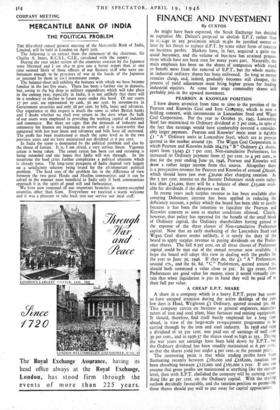FINANCE AND INVESTMENT
By CUSTOS
As might have been expected, the Stock Exchange has decided to capitalise Mr. Dalton's propcsal to abolish E.P.T. rather than to ir.,...u;ge in any pessimism which might be justified sooner or later by his threat to replace E.P.T. by some other form of taxation on business profits. Markets have, in fact, acquired a quite un- usual buoyancy, and the volume of business has attained propor- tions which have not been seen for many years past. Naturally, the main emphasis has been on the shares of companies which stand to benefit most from the removal of E.P.T., but the whole market in industrial ordinary shares has been enlivened. So long as money remains cheap, and, indeed, gradually becomes still cheaper, the process of yield adjustment must- bring higher prices for leading industrial equities. At some later stage commodity shares will probably join-in the upward movement.
PEARSON & KNowLgsff POSITION I have drawn attention from time to time to the position of the Pearson and Knowles Coal and Iron Company, which- is now a holding concern, with investments in Lancashire Steel and Wigan Coal Corporation. For the year to October 31, 1945, Lancashire Steel has maintained its Ordinary dividend at 7 per cent.„ in spite of the fact that earnings would have comfortably covered a consider- ably larger payment. Pearson and Knowles' main asset is 647,670 Li " A " Ordinary units in Lancashire Steel, which are at present quoted in the market around 235. The Wigan Coal Corporation, in which Pearson and- Knowles holds 264,774 " B " Ordinary. £x shares, apart from 53,043 £.1 7 per cent. Non-cumulative Preferences, has increased its Ordinary payment from 21 per cent. to 4 per cent., so that for the year ending June 3o, 1946, Pearson and Knowles will draw a rather larger income from this source. Altogether there is a prospective revenue for Pearson and Knowles of around £6o,000, which should leave just over £3o,000 after charging taxation. As the 5 per cent. interest on the Income Debenture stock costs rather less than £15,000, there will be a balance of about £15,000 avail- able for dividends if the directors see fit.
In recent years such surplus revenue as has been available after covering Debenture interest has been applied in reducing the deficiency account, a policy which: the board has been able to justify because it has been the intention to liquidate the Pearson and Knowles concern as soon as market conditions allowed. Clearly, however, that policy has operated for the benefit of the small block of Ordinary capital, the Ordinary shareholders having gained at the expense of the three classes of Non-cumulative Preference capital. Now that an early marketing of the Lancashire Steel and Wigan Coal shares seems unlikely, it is surely the duty of the board to apply surplus revenue in paying dividends on the Prefer- ence shares. The full 6 per cent. on all three classes of Preference capital could be met out of the annual revenue now available. I hope the board will adopt this view in dealing with the profits for the year to June 3o, 1946. If they do, the Li " A " Preferences, around 17s., and the 6s. 8d. " C" Prefe'rences, quoted around 5s., should both command a value close to par. In apy event, these Preferences are good value for money, since it seem i' virtually cer- tain that when liquidation is put in hand they will be paid off at their full par value.
A CHEAP E.P.T. SHARE A share in a company which is a heavy E.P.T. payer but seems to have. escaped attention during the active dealings of the past few days is Head, Wrightson Li Ordinary, quoted around 31s. 6d. This company carries on business as general engineers, manufac- turers of iron and steel plant, blast furnaces and mining equipment. It should, therefore, fmd itself busily employed for a long time ahead, in view of the large-scale re-equipment programme to be carried through by the iron and steel industry. In 1938 and 1939 a dividend of to per cent. was paid out of earnings of well over 3o per cent., and in 1936-37 the shares stood as high as 35s. During the war years net earnings have been held down by E.P.T., but the Ordinary dividend has been steadily maintained at 6 per cent.: so that the shares yield just under 4 per cent.- at the present price. The interesting point is that while trading profits have been fluctuating recently between LI8o,000 and Z2.28,000, taxation has been absorbing between £125,000 and £165,000 a year. If one can assume that gross profits are maintained at anything like the current level, then with E.P.T. abolished the company will be earning some- thing like 4o per cent. on the Ordinary capital. With the trading outlook decidedly favourable, and the taxation position so proinisinfo these shares should pay well to pat away for capital appreciation.






























 Previous page
Previous page